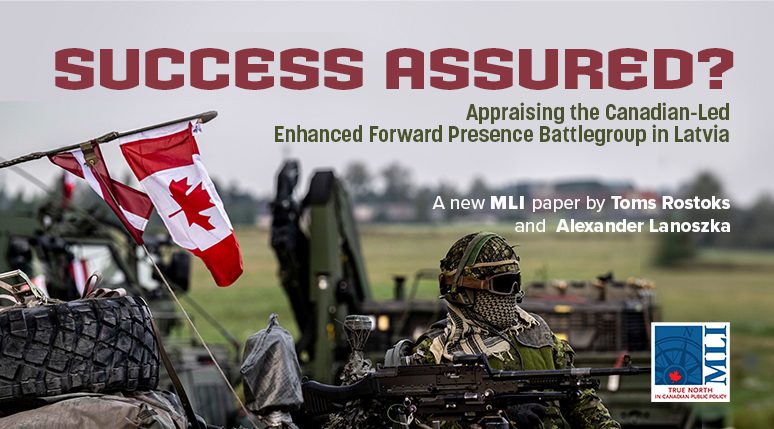Titled Success assured? Appraising the Canadian-Led Enhanced Forward Presence Battlegroup in Latvia, and published by the respected Macdonald-Laurier Institute (MLI) Canadian thinktank, authors Toms Rostoks (Director of the Centre for Security and Strategic Research at the National Defence Academy of Latvia) and Alexander Lanoszka (Associate professor of international relations in the department of political science at the University of Waterloo in Canada and a Senior Fellow with the Macdonald-Laurier Institute) offer their assessment of the battlegroup, identifying its strengths as well as the challenges it faces.
“The fundamental problem facing the battlegroup is that its capabilities might be insufficient to properly defend Latvia against a highly resolved and militarily reconstituted Russia,” observe Rostoks and Lanoszka.
The full paper, which makes for thought-provoking reading, is available to download and to read online here.
It notes that so far the Canadian-led battlegroup has been a major success, but does not dodge the question of whether it will be sufficient in its present form.
"The Canadian-Latvian partnership, now in its seventh year, has not only been trouble-free, but also a success story. Canadian troops are welcome, there have been no significant incidents involving Canadian forces, Latvia has significantly altered its military posture, and the multinational diversity that characterizes the battlegroup seems to be a source of strength rather than of weakness. Nevertheless, despite such success, challenges appear to be mounting," note the authors.
"The Latvian government may face its own difficulties in increasing defence spending up to 3 percent of gross domestic product by 2027. Its own economic development has fallen behind that of its Baltic neighbours and sustaining such high levels of military expenditures over the long run may be challenging," they say.
In addition, the public in Canada needs to be aware that their country's commitment to defed the Baltic states may need to be in place for a long time, saying efforts are needed to "Prepare members of the Canadian public for a long-term containment strategy against Russia because the low visibility of the eFP mission may mean a lack of understanding of the stakes involved as well as of commitments that the Canadian government has undertaken to European security."
"The fundamental problem facing the battlegroup is that its capabilities might be insufficient to properly defend Latvia against a highly resolved and militarily reconstituted Russia. Canada is unlikely to be able to contribute beyond its current military commitment. Moreover, being situated on the other side of the Atlantic Ocean means that Canada cannot surge its military presence in Latvia rapidly. Indeed, Canada announced cuts to its defence budget at a time when the Canadian Armed Forces is already under severe strain. In the short-term at least, it is reassuring that Canada will indeed deploy 2200 troops to Latvia and will have equipment prepositioned for the whole brigade. In the medium-to-long term, however, doubts remain about the ability of Canada to carry out its pledges fully and effectively," says the paper.





























